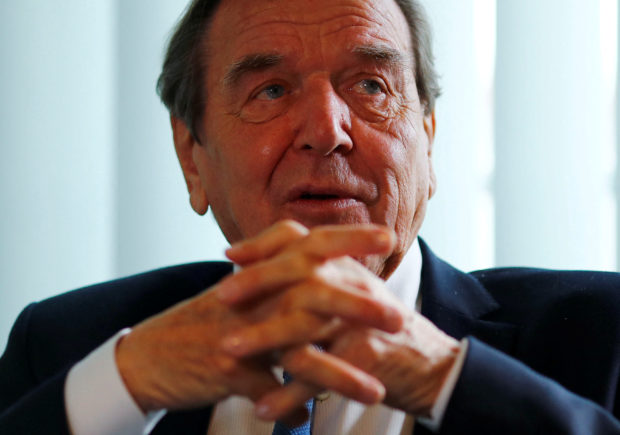
Former German Chancellor Gerhard Schroeder is pictured during an interview with Reuters in his office in Berlin, Germany, November 15, 2018. Picture taken November 15, 2018. REUTERS FILE PHOTO
ISTANBUL/LONDON — The deal between Moscow and Kyiv to unblock Ukrainian grain exports may offer a way forward to a possible ceasefire in the five-month conflict, said former German chancellor Gerhard Schroeder, a friend of Russian President Vladimir Putin.
The first grain-carrying ship to leave Ukrainian ports in wartime safely anchored off Turkey’s coast on Tuesday and is due to be inspected on Wednesday.
“The good news is that the Kremlin wants a negotiated solution,” Schroeder told Stern weekly and broadcasters RTL/ntv on Wednesday, adding he had met Putin in Moscow last week.
“A first success is the grain deal, perhaps that can be slowly expanded to a ceasefire,” he said.
Schroeder said solutions to crucial problems such as Crimea, which Russia annexed in 2014, could be found over time, “maybe not over 99 years, like Hong Kong, but in the next generation”.
Schroeder, chancellor from 1998 to 2005, has criticized the war in Ukraine but refused to condemn Putin.
The Sierra Leone-flagged cargo ship Razoni, carrying Ukrainian grain, is seen in the Black Sea off Kilyos, near Istanbul, Turkey August 2, 2022. REUTERS
Meanwhile, Russia has accused the United States of being directly involved in the conflict in Ukraine and not just supplying Kyiv with arms.
Russia’s defense ministry, headed by an ally of Putin, said comments made by Vadym Skibitsky, Ukraine’s deputy head of military intelligence, to Britain’s Telegraph newspaper showed that Washington was entangled in the conflict.
Skibitsky told the paper there was consultation between U.S. and Ukrainian intelligence officials before strikes and Washington had an effective veto on intended targets, but that U.S. officials were not providing direct targeting information.
“All this undeniably proves that Washington, contrary to White House and Pentagon claims, is directly involved in the conflict in Ukraine,” the Russian defense ministry said in a statement on Tuesday.
“It is the Biden administration that is directly responsible for all Kyiv-approved rocket attacks on residential areas and civilian infrastructure in populated areas of Donbas and other regions, which have resulted in mass deaths of civilians.”
There was no immediate reaction from the White House or Pentagon to the ministry’s assertions.
The Pentagon did deny, however, Moscow’s claims that Russia had destroyed six U.S.-made HIMARS missile systems since the start of the Ukraine war. Russia regularly claims it has hit HIMARS but has yet to show proof.
Ukraine and the West accuse Russia of carrying out devastating missile attacks on civilian targets on an almost daily basis. Both sides deny deliberately targeting civilians.
Ukrainian servicemen fire with a BM21 Grad multiple launch rocket system in a frontline in Kharkiv region, as Russia’s attack on Ukraine continues, Ukraine August 2, 2022. REUTERS
Donbas: ‘Just hell’
Ukrainian President Volodymyr Zelensky on Tuesday said that despite arms supplies from the West, his country’s forces could not yet overcome Russian advantages in heavy guns and manpower.
“This is very much felt in combat, especially in the Donbas. … It is just hell there. Words cannot describe it.”
Germany’s Schroeder said the future of Donbas was complicated. Donbas, Ukraine’s traditional industrial heartland in the east, has seen some of the war’s heaviest fighting.
Russia sent tens of thousands of troops into Ukraine on Feb. 24 in what it calls a “special military operation”. Kyiv and the West have condemned it as an unprovoked war of aggression.
At a U.N. conference on Tuesday, Igor Vishnevetsky, deputy director of the department for non-proliferation and arms control of the Russian foreign ministry, refuted all allegations of “unprovoked aggression”. He also added that Moscow was convinced a nuclear war “must never be fought”.
Russian diplomat Alexander Trofimov told the United Nations that Moscow would only use nuclear weapons in response to weapons of mass destruction or a conventional weapons attack that threatened the existence of the Russian state.
“None of these two hypothetical scenarios is relevant to the situation in Ukraine,” said Trofimov, a senior diplomat in the non-proliferation and arms control department of Russia’s foreign ministry.
The Sierra Leone-flagged cargo ship Razoni, carrying Ukrainian grain, is seen in the Black Sea off Kilyos, near Istanbul, Turkey August 2, 2022. REUTERS
Safe passage
Meanwhile, a July 22 U.N.-brokered deal to unblock Ukrainian grain exports had an initial success as the first loaded ship since Russia’s invasion safely anchored off the Turkish coast.
The vessel, the Sierra Leone-flagged Razoni was at the entrance of the Bosphorus Strait, which connects the Black Sea to world markets, around 1800 GMT on Tuesday, some 36 hours after leaving the Ukrainian port of Odesa.
The ship, which is loaded with 26,527 tonnes of corn, is due to be inspected on Wednesday in Turkey.
U.N. spokesman Stephane Dujarric told reporters in New York there were about 27 ships in the three Ukrainian ports covered by the export deal that were ready to go.
The exports from one of the world’s top grain producers are intended to help ease a global food crisis.
Known as Europe’s breadbasket, Ukraine hopes to export 20 million tonnes of grain held in silos and 40 million tonnes from the harvest now under way, initially from Odesa and nearby Pivdennyi and Chornomorsk.
Russia has called the Razoni’s departure “very positive” news. It has denied responsibility for the food crisis, saying Western sanctions have slowed its exports.
RELATED STORIES
Ukraine president asks gov’t to study legalizing same-sex marriages
War in Ukraine: Latest developments
‘Too early’ to celebrate grain shipment—Zelensky
First Ukraine grain ship since start of war leaves Odesa